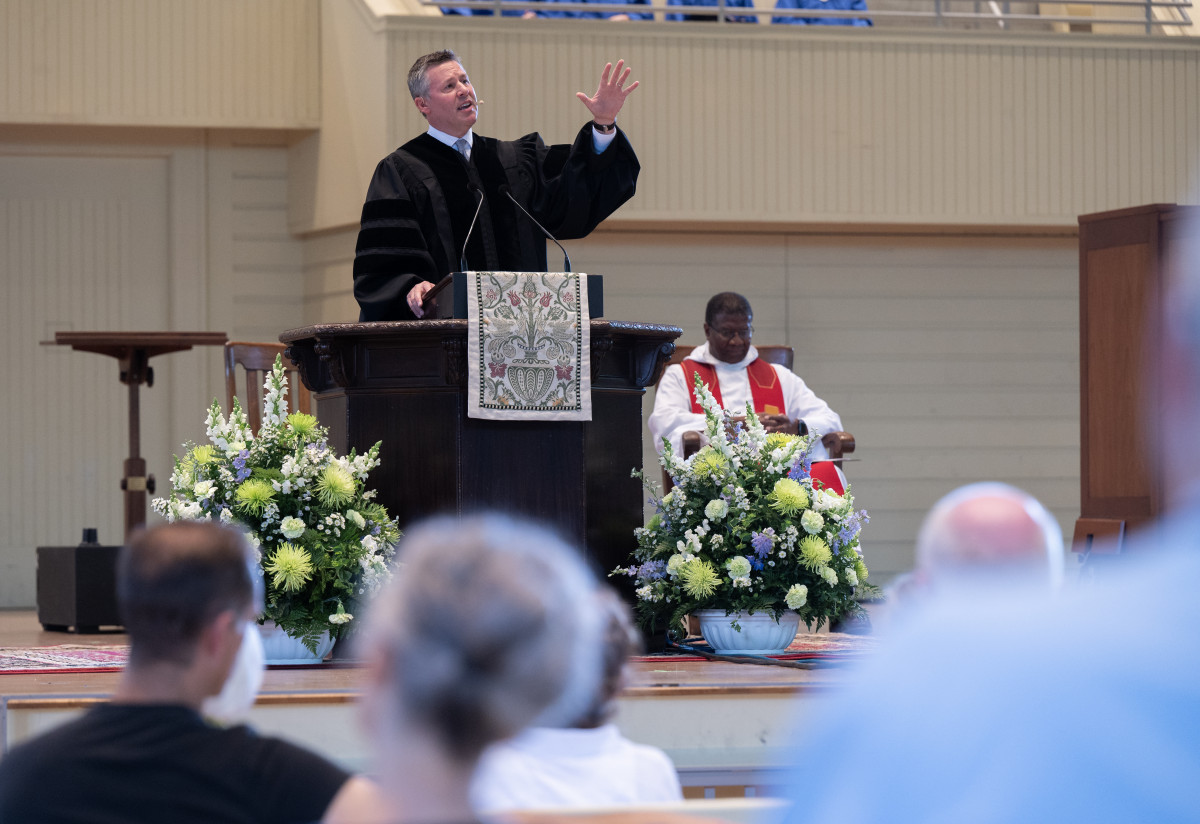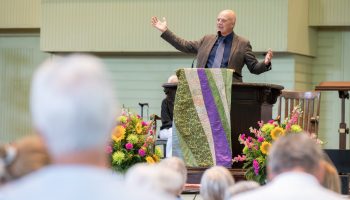
The Rev. Richard Kannwischer opens his sermon series Sunday in the Amphitheater.
The Rev. Richard Kannwischer began his sermon at the 9:15 a.m. Wednesday morning worship service in the Amphitheater with a question for the congregation. “Do you think you are an important person? Turn to the person next to you and ask them, ‘Do you think you are an important person?’ ”
The title of Kannwischer’s sermon was “What I Got Wrong About Love,” and the scripture reading was Luke 18:9-14. The topic was “Because I Believe He (Jesus) Suffered under Pontius Pilate, was Crucified, Died and was Buried, I will Love Sacrificially.”
Kannwischer asked for a show of hands from the congregation and a good number raised their hands to indicate they believe themselves to be an important person. “In 1950, about 12% of people said they were an important person. In 2005, about 80% said they were an important person,” he said.
He continued: “That was right before the advent of social media. It is amazing how things have changed in just two generations.”
As an illustration, Kannwischer described an incident when he was in college. He was standing outside the dining hall, ranting and complaining about something. His best friend started circling around him. Finally Kannwischer asked him to stop and listen to his complaint. His friend said, “Sorry, I got stuck in your orbit. What were you trying to say?”
Author C.S. Lewis called pride the granddaddy of sin. Contemporary author David Brooks writes about the “Big Me” culture.
Kannwischer had read Self-Made, by Tara Isabella Burton, who spoke at the 2 p.m. Monday Interfaith Lecture in the Hall of Philosophy.
“I don’t think we have seen the rise in self-made culture because people have lost faith in institutions. I think it is the opposite,” Kannwischer said. “I think people have put their trust in themselves and then don’t like institutions because they don’t bend to us.”
He continued: “These institutions and organizations used to be formative; now they are performative, telling our stories and our brands.”
When the majority of people lived on farms, they knew they were a little part of a big reality. People were dependent on the right conditions of soil, water and other natural phenomena. As people urbanized and digitized, “they became divorced from the basics of reality. We believe the world operates around us,” Kannwischer said
“We believe that reality will bend to us. It used to be that truth was outside us and feelings were inside. Now the truth is inside and feelings are outside. We are in the process of self-divination,” he said. “Older societies called this pride or narcissism. Today we are more self-absorbed. We can’t stand up to the trials of reality.”
Kannwischer found that during COVID-19, young people were floored; they had no scaffolding in their lives to fall back on.
“The great anthem of this condition is the most annoying song from Disney’s ‘Frozen’ — ‘Let it Go,’ ” he said. He quoted a verse: “It’s funny how some distance makes everything seem small / And the fears that once controlled me can’t get to me at all / It’s time to see what I can do / To test the limits and break through / No right, no wrong, no rules for me / I’m free.”
In the scripture reading from Luke’s gospel, Jesus told a story about people who trust too much in their inner righteousness.
“If love is to will the good for the other, then contempt is the opposite,” Kannwischer said. It is hard for us to read this story, he told the congregation, because we have a jaded view of the Pharisees.
Pharisees were well-respected members of the Jewish community in Jesus’ time and tax collectors were considered traitors to the community. But in Jesus’ parable, the “traitor” prayed the correct way and the well-respected citizen exalted himself.
Kannwischer pointed out several unique aspects of the parable. It is the only one Jesus told that takes place in the Temple. When the tax collector is beating his chest, he is asking God for a sacrifice (a hilaskomia) to be made for him. The only other time was when a man was beating his chest at the crucifixion.
“The Pharisee brought his own thanks (eucharisto), his own sacrifice to the Temple. The tax collector asked God to provide a sacrifice for him,” Kannwischer said.
British theologian and Anglican bishop N.T. Wright tells a story in “Hope Amid the Broken Signposts,” that the late cardinal archbishop of Paris, Jean-Marie Lustiger, used to tell.
It’s “ ‘the story of the three boys who played a trick on the local priest, by going into the confessional and ‘confessing’ all kinds of wild stories. The first two ran away, and the priest wasn’t fooled. He gave the third boy — who happened to be Jewish — a penance to perform. He told him to go to the far end of the church, to look up at the large crucifix hanging there, and to say to the figure on the cross, ‘You did all that for me — and I don’t give a damn.’ He told him to do it three times. Off went the boy; this was all still part of the game. ‘You did all that for me,’ he said, ‘and I don’t give a damn.’ Then he said it the second time. And then … he couldn’t say it the third time. He broke down, and left the church a changed person. ‘And the reason I know that story,’ the archbishop would conclude, ‘is that I was that young man.’ ”
“The antidote to self-divination is looking at the great love of God who emptied himself to make a sacrifice for us,” Kannwischer said.
He shared a story about Pastor Roy in Costa Rica. Roy used to be an executive with a large international company and is a bodybuilder. He asked God to show him where to serve and he went to a small village in Costa Rica.
Pastor Roy went to the village priest to ask if there were unmet needs in the village that he could address. The priest pointed to a ravine where the village got its water and said, “Clean up the trash and then put yourself in, because that is what you are.”
As a bodybuilder, Roy thought about punching out the priest, but as he prayed he asked God how to be a man of God. God told him, “The priest is right — not about you being trash, but go and pick up the trash.”
Roy started to pick up the trash every day and soon a couple of people joined, then others until it became a movement to help others. “Seventy percent of the people in that village go to his church,” Kannwischer said. “Those who are humbled will be exalted. Even Disney knows this. At the end of ‘Frozen’ it is Anna’s self-sacrificial love that saves the day.”
Kannwischer said, “As Christians, we have a unique resource in the God who humbled himself in Jesus Christ so that we can be exalted. We have to find a way to pick up the trash, to empty ourselves in love for others. It is most important that we enter into God’s orbit, not forcing others into ours.”
The Rev. Mary Lee Talbot, Ph.D., a graduate of Children’s School and Boys’ and Girls’ Club, presided. Melissa Spas, vice president for religion at Chautauqua Institution, read the scripture. The prelude, played by Owen Reyda, 2024 organ scholar, on the Massey Memorial Organ, was “Fountain Reverie,” by Percy Fletcher. Joshua Stafford, director of sacred music and the Jared Jacobsen Chair for the Organist, directed the Motet Choir in an a cappella anthem “God so loved the world,” by John Stainer. Reyda played “Con moto maestoso,” from Sonata No. 3 by Felix Mendelssohn. Support for this week’s services and chaplaincy is provided by the Robert D. Campbell Memorial Chaplaincy and the Mr. and Mrs. William Uhler Follansbee Memorial Chaplaincy.




